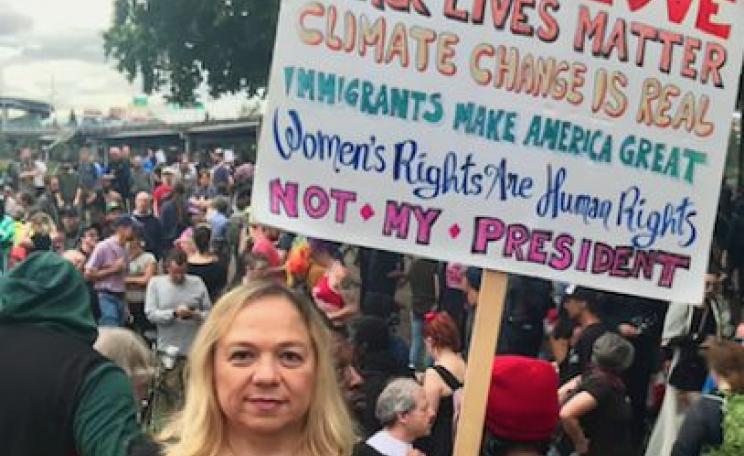Their compelling book ends with a call for a new environmental anti-fascism.
What politics will dominate in the years to come? There is no particular reason to assume that a greater awareness of environmental and social catastrophe will lead to greater cultural understanding or a more egalitarian use of the state.
Read an extract: Ecofascism and Indian nationalism.
It is just likely that the rich will retreat behind their gated communities and that more and more spending will go on national borders, violent policing and the racialised exclusion of the newly-dispersed poor.
Sam Moore and Alex Roberts are the co-hosts of the anti-fascist podcast, ’12 Rules for What’. Their book begins with an account of the historical overlap between ecological and fascist thinking.
Fury
This can be traced back to the likes of Richard Walter Darré, the Nazi Minister of Food and Agriculture, who sought to win his party to a kind of feudal socialism, in which peasant farmers’ links to the earth would be protected, while at the same time the German empire would expand land colonies deep into Eastern Europe.
Darré’s nearest counterpart in Britain was Jorian Jenks, agricultural correspondent for the British Union of Fascists and later editor of Mother Earth, the journal of the Soil Association.
Between 2016 and spring 2020, the far right grew in the United States, Europe and elsewhere under the patronage of President Donald Trump.
During this period the electoral far right, as Moore and Roberts note, was not “fascist” in the terms set out in their book - “a political form that seeks to revolutionize and reharmonize the nation state through expelling a radically separate ‘Other’ by paramilitary means”.
Their compelling book ends with a call for a new environmental anti-fascism.
Trump, and the leaders closest to him were not revolutionaries, nor did they have a shared and defining other. Rather they had a series of others against which Trump in particular raged in impotent fury.
Collapse
Moreover Trump was not an “ecofascist” either: the dominant approach undertaken by him and by the likes of Jair Bolsonaro in Brazil was not to treat global warming as a fact and use it to justify a turn towards more authoritarian states. Rather, it was to deny ecocide.
Trump claimed that global warming was “mythical”, “non-existent”, and “an expensive hoax”. Superficially, this sounds like a very different argument from those who admit global warming. Yet Moore and Roberts argue that the differences are less than they seem.
One author whose insights complement their approach is Keith Kahn-Harris whose own book Denial is an extended comparison of Holocaust denial and the denial of ecocide.
In both cases, Kahn-Harris argues that behind the apparent denial of an evident truth, a different approach is lurking, in which the deniers are not saying really that destruction did not or will not happen.
The deniers are always about to admit their true position, namely that it would not be so bad if six million Jews had died, or if our environment did collapse.
Massacres
Trump and Bolsonaro, of course, attempted to meet Covid with a very similar stance of denial. The result in the US was significantly higher fatalities among the very demographic of elderly voters on which the Republican party has come to rely.
Trump lost his election; Bolsonaro seems likely to follow him. Having built up armies of millions of right-wing followers, those supporters are temporarily bereft of a home. “It is this failure – insisting that the function of government remains, in the words of Joshua Clover to ‘make work and let buy’ – that opens up space for the far right,” according to Moore and Roberts.
What we have seen since then is the rise of a disparate group of activists, bloggers, political parties, and even individual terrorists who have accepted the imminence of catastrophe, exulted in it, and argued that the solution to disaster is the willed depopulation of their racial enemies, meaning liberals, socialists, LGBT people, Muslims, or the inhabitants of the global South.
One early sign of this new politics was the 2019 Christchurch mosque attack, which was justified by its perpetrator - Moore and Roberts follow a lead set by anti-racists in New Zealand in refusing to name him - who justified his murder of 51 people with a manifesto declaring, “It’s the birth rates.”
Moore and Roberts explain what he meant: that birth rates are falling faster in the global North than they are in Africa or India. Therefore white populations are destined to become extinct. From the shooter’s perspective, this demographic nightmare can be pre-empted only by going out now and carrying out massacres of “migrants”.
Consequences
It would be easy to read a book such as this and be overwhelmed by the stupidity and violent acts it describes. But that is not Moore or Robert’s intention.
Rather they are hoping to “disrupt” the link between climate systems breakdown and fascism, by warning their readers, and calling on all of us to ensure that is the better part of our politics which thrives.
Their compelling book ends with a call for a new environmental anti-fascism. They champion heterogeneous cultural spaces in which anti-racism and environmental thinking can thrive.
They demand ecological relations “which restore and respect natural systems whilst attacking systems of private ownership of the means of production and attempting to re-common the world”.
They propose an instinct of solidarity between groups of people living in the global North and South. They insist that: “It is never too late to act, either on emissions or on their human and political consequences.”
This Author
David Renton is a barrister and the author of The New Authoritarians: Convergence on the Right, published by Pluto Press, London, 2019.







